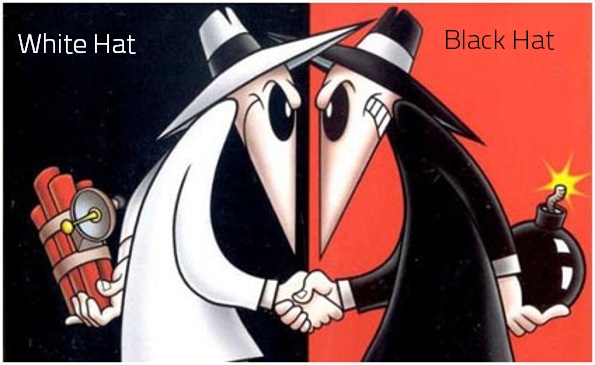Hacking : The common myths and careers
“To beat a hacker, you need to think like one!” – EC-Council
White hat, black hat, gray hat. Wondering what these are? Surely not those colourful hats sold on the beaches of Goa. These are the different categories into which hackers are often categorised based on their behaviour. Hacker is often interpreted as a “criminal” or a “bad guy”. He manages to seek and exploit weaknesses in computer software systems. The definition is pretty controversial and invites a lot of eye stares. But what about the ethical ones of the lot? Let’s look at all the categories closely.

A black hat hacker exploits computer security for personal gain (like stealing) or for pure maliciousness. They are the ones who fit the stereotype of hacking associated with unethical practices. A white hat hacker, completely opposite of the black hat hacker, is involved into ethical hacking practices. Like the former, the latter does exploit the weakness in the computer software and finds loopholes but with prior permission of the reporting organisation. Instead of vandalizing the security system, he reports them to the respective organisation, allowing the organisation to improve its defenses through a process known as “penetration testing”. Organisations often pay large amount of money to white hackers to be able to discover such vulnerabilities. As they say, it’s never black or white, it’s gray. So there exists gray hat hacker who might gain access to the software for personal gain, but might make the company aware of its loopholes in the end. Since he isn’t granted the right for access, it might be considered as illegal or unethical hacking.
Organisations which take cyber security very casually end up becoming victims of cyber crimes. Ethical hackers are required to curb this menace of cyber crimes. They save the organisations from anti-social online attacks, through figuring out the loopholes. And they get paid for using their destructive mind in a rather constructive way.
Most companies that use the services of ethical hackers are in the banking or technology sector. Banks naturally have a lot of money riding on security and IT companies have contractual data  protection obligations with clients. So white hat hackers are pretty much in demand. But according to the 2014 National Cyber Security Policy, India needs almost 500,000 cyber security experts, while rough estimates put the current available personnel at about 30,000. The reason for such low numbers are lack of implementation of proper cyber laws, less cyber crimes research and fewer educational centres offering hacking as a course. In order to make ethical hacking accessible to large number of people, there is a need to revamp and align college curriculum.
protection obligations with clients. So white hat hackers are pretty much in demand. But according to the 2014 National Cyber Security Policy, India needs almost 500,000 cyber security experts, while rough estimates put the current available personnel at about 30,000. The reason for such low numbers are lack of implementation of proper cyber laws, less cyber crimes research and fewer educational centres offering hacking as a course. In order to make ethical hacking accessible to large number of people, there is a need to revamp and align college curriculum.
The demand for ethical hackers is not limited only to the IT sector. Such experts are required by financial service providers, airlines, retail chains, hotels and e-commerce companies. Government agencies such as military and law enforcement agencies, defence organisations, forensic laboratories, detective companies, investigative services offer challenging roles for ethical hackers. Some skilled hackers also get to to work for investigation agencies like the Central Bureau of Investigation, the National Security Agency and the Federal Bureau of Information. Some large organisations employ security testers and others use contractors to audit their systems.
Internshala offers training in ethical hacking as part of its Online Summer Trainings. We realise the need for ethical hackers and the growing demand to learn the same. Our experts equipped with proficient knowledge regarding the course clear any student doubts through live chats and forums.
So get down and become a clever hacker, and provide your services to the organisations in need. Don’t forget to wear your white hat!
Referred Articles: http://www.business-standard.com/article/companies/cyber-emergency-teach-train-and-employ-half-a-million-ethical-hackers-114030501258_1.html
Image Credits: blog.rivalhost.com, techonn.com



